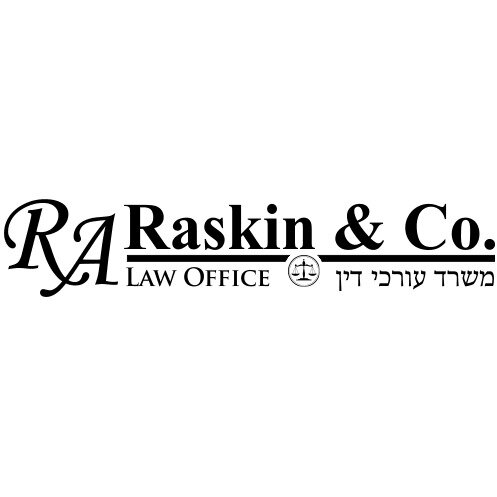Best Native People Lawyers in Haifa
Share your needs with us, get contacted by law firms.
Free. Takes 2 min.
List of the best lawyers in Haifa, Israel
About Native People Law in Haifa, Israel
Haifa, Israel, is a diverse city housing various communities, including Native People. The term "Native People" in an Israeli context often refers to the indigenous Bedouin populations, Druze communities, and some Palestinian Arab groups who have historically lived in the region. Understanding the legal context of these communities can be intricate due to a mixture of customary practices, and state laws, and the unique historical background that each community presents.
Why You May Need a Lawyer
Needing legal assistance can arise from various situations such as land disputes, inheritance issues, civil rights violations, housing regulations, and more. Here are some common scenarios:
- Land Disputes: Legal help might be required to resolve ownership claims, usage rights, and property transactions.
- Inheritance Issues: Navigating issues of inheritance, which may involve both customary and civil law.
- Civil Rights: Protecting the rights of Native People against discrimination or ensuring fair treatment under the law.
- Housing and Development: Guidance on issues related to government housing plans, development projects, and displacement.
- Employment Law: Ensuring fair labor practices and resolving employment disputes.
Local Laws Overview
The legal framework concerning Native People in Haifa includes Israeli civil law, which governs general legal matters, and specific regulations that may impact these communities. Key aspects include:
- Civil Rights Legislation: Laws aimed at protecting minorities from discrimination and ensuring equality.
- Land and Property Laws: Regulations concerning land ownership, usage rights, and zoning can affect Native communities.
- Planning and Construction Law: Laws related to urban planning, development, and the preservation of historical and cultural sites.
- Customary Law: In some cases, aspects of customary law recognized within the community may influence legal proceedings.
Frequently Asked Questions
1. What laws protect the rights of Native People in Haifa?
Various legislation, including civil rights laws and anti-discrimination statutes, protect Native People in Haifa.
2. Can customary laws be considered in legal disputes?
Yes, in some cases, particularly concerning family and inheritance laws, customary practices may be considered alongside civil legislation.
3. What should I do if I face discrimination?
Contact a lawyer who specializes in civil rights. They can help you file complaints with relevant governmental bodies or take legal action.
4. Are there specific lawyers for Native People in Haifa?
Yes, there are lawyers and legal organizations specializing in issues relating to Native People and their rights.
5. How do I resolve a land dispute?
Engage a lawyer specializing in property law and potentially, customary law. It may involve mediation, arbitration, or court proceedings.
6. Where can I get free legal advice?
Several NGOs and community organizations provide free or low-cost legal aid and advice to Native People.
7. How do I approach inheritance disputes?
A specialized lawyer can guide you through both civil law and any relevant customary practices to resolve inheritance issues.
8. What rights do I have regarding government housing projects?
You have the right to fair treatment and potential compensation if projects affect your property. Legal assistance can ensure your rights are upheld.
9. Can I get legal help for employment disputes?
Yes, employment lawyers can help you understand your rights and represent you in disputes involving workplace discrimination or unfair practices.
10. How can I preserve cultural sites or traditions legally?
Consulting with a lawyer can help you understand the legal processes for protecting cultural and historical sites and recognizing practices formally.
Additional Resources
Here are some valuable resources for Native People seeking legal advice in Haifa:
- Israeli Bar Association: Provides lawyer directories and resources.
- The Association for Civil Rights in Israel (ACRI): Offers legal aid and works to protect civil rights.
- Adalah - The Legal Center for Arab Minority Rights in Israel: Focuses on legal issues affecting the Arab minority, including Native People.
- Community Centers: Local community centers and organizations often provide legal advice or can refer you to specialists.
Next Steps
If you need legal assistance, here are the steps to take:
- Identify Your Issue: Clearly outline the legal problem you are facing to communicate effectively with a lawyer.
- Seek Professional Help: Contact a lawyer or legal organization specializing in your specific issue.
- Prepare Documentation: Gather all relevant documents, such as property deeds, employment contracts, or any correspondence related to your case.
- Consult and Act: Work closely with your lawyer to discuss your options, develop a strategy, and follow through with the necessary legal actions.
Taking these steps ensures you address your legal needs efficiently and with professional guidance.
Lawzana helps you find the best lawyers and law firms in Haifa through a curated and pre-screened list of qualified legal professionals. Our platform offers rankings and detailed profiles of attorneys and law firms, allowing you to compare based on practice areas, including Native People, experience, and client feedback.
Each profile includes a description of the firm's areas of practice, client reviews, team members and partners, year of establishment, spoken languages, office locations, contact information, social media presence, and any published articles or resources. Most firms on our platform speak English and are experienced in both local and international legal matters.
Get a quote from top-rated law firms in Haifa, Israel — quickly, securely, and without unnecessary hassle.
Disclaimer:
The information provided on this page is for general informational purposes only and does not constitute legal advice. While we strive to ensure the accuracy and relevance of the content, legal information may change over time, and interpretations of the law can vary. You should always consult with a qualified legal professional for advice specific to your situation.
We disclaim all liability for actions taken or not taken based on the content of this page. If you believe any information is incorrect or outdated, please contact us, and we will review and update it where appropriate.










